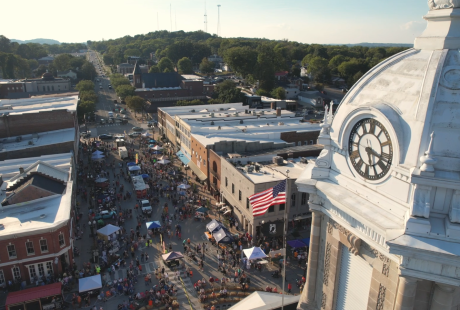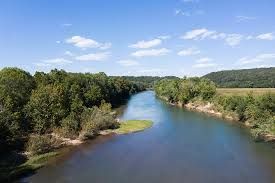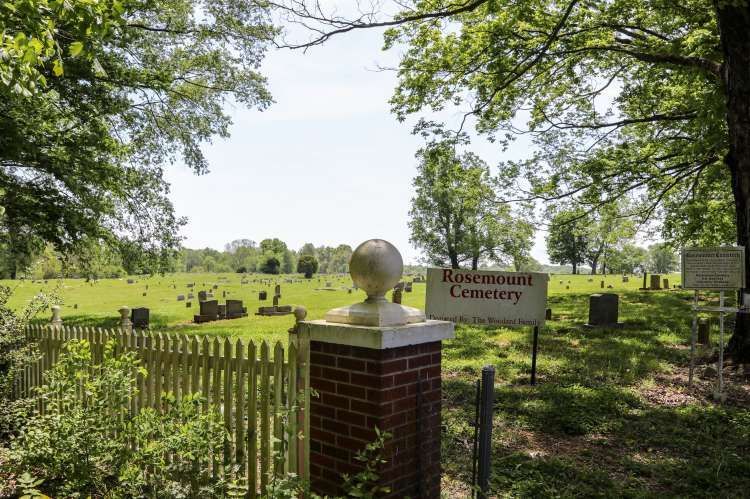
Columbia, Tennessee – A Historic Small Town with Big Charm
Address: Columbia Visitors Center, 713 N Main St, Columbia, TN 38401
Columbia, Tennessee, affectionately known as “Muletown,” is a historic small city in Maury County that has managed to keep its Southern charm while embracing growth and cultural revitalization. Located about 45 miles south of Nashville, Columbia has become a popular destination for those seeking a blend of history, community, and vibrant local culture.
A Rich History
Founded in 1807, Columbia quickly became a hub of commerce and agriculture. Its fertile soil made it a center for mule trading, earning it the nickname “The Mule Capital of the World.” Today, Columbia still celebrates this legacy each spring during Mule Day, a festival that attracts tens of thousands of visitors. Mule Day includes parades, craft fairs, and mule competitions, and it continues to highlight Columbia’s unique agricultural heritage.
The city is also home to significant political history. Columbia was the boyhood home of James K. Polk, the 11th President of the United States. The James K. Polk Home & Museum, located at 301 W 7th St, preserves his legacy and offers a glimpse into the early 19th century.
Downtown Revival
One of Columbia’s biggest draws is its thriving downtown square. Once filled with empty storefronts, the square has undergone a remarkable revival. Today, it is bustling with boutiques, antique shops, coffee houses, and locally owned restaurants. Visitors can stroll through beautifully restored buildings while enjoying the welcoming atmosphere of a close-knit community.
The Maury County Courthouse, with its classical architecture, sits proudly in the middle of the square, reminding visitors of Columbia’s historic roots. Many locals see downtown as the heartbeat of the city, where history and modern living intersect.
Cultural Attractions
Columbia has positioned itself as a hub for arts and culture. Venues like The Mulehouse (812 S High St) bring live music to town, while Homestead Hall at Hardison Mill (4544 Highway 431) offers intimate concerts that reflect Columbia’s tradition of storytelling through song.
The town also hosts art walks, seasonal festivals, and community events that keep residents engaged and draw in visitors from across Middle Tennessee.
Outdoor Adventures
Nature lovers are never far from adventure in Columbia. The Duck River, which runs through the city, is the most biodiverse river in North America. Locals and visitors alike enjoy kayaking, canoeing, and fishing along its winding path. The river is also a favorite spot for birdwatching and peaceful walks along the shore.
Additionally, Columbia has several scenic parks, including Riverwalk Park (102 Riverside Dr) and Chickasaw Trace Park (1419 New Hwy 7), which offer opportunities for biking, hiking, and family picnics.
A Community with Heart
Columbia’s small-town friendliness remains one of its biggest appeals. With a population of around 45,000, the city is large enough to offer modern conveniences but small enough to maintain a neighborly spirit. Locals are passionate about supporting small businesses, volunteering, and preserving Columbia’s history while embracing new opportunities for growth.
Visiting Columbia
Whether you are exploring the historic square, attending Mule Day, paddling down the Duck River, or enjoying live music, Columbia offers something for everyone. Its blend of heritage, natural beauty, and culture makes it one of Tennessee’s hidden gems.
For first-time visitors, the Columbia Visitors Center at 713 N Main St is the perfect place to start. Staff can provide maps, event information, and recommendations for exploring this vibrant Southern town.

The Duck River in Columbia, Tennessee – Nature’s Hidden Treasure
Address: Duck River Access at Riverwalk Park, 102 Riverside Dr, Columbia, TN 38401
The Duck River is one of Columbia, Tennessee’s greatest natural treasures. Flowing for 284 miles through Middle Tennessee, it is the longest river located entirely within the state. More importantly, it has earned recognition as the most biodiverse river in North America, making it both an ecological wonder and a recreational paradise.
A River Full of Life
The Duck River supports more than 150 species of fish, 50 species of freshwater mussels, and countless plants and wildlife. Biologists often study the river for its unique ecosystem, and conservation groups work diligently to ensure its health. This natural diversity has made the Duck River a protected and celebrated waterway, not just for Columbia, but for all of Tennessee.
Recreation on the River
For outdoor enthusiasts, the Duck River is a haven. In Columbia, locals and visitors flock to Riverwalk Park (102 Riverside Dr) to access the water. The park offers boat ramps, picnic areas, and trails that run alongside the river.
Canoeing and kayaking are especially popular. The river’s gentle currents and winding path make it suitable for paddlers of all skill levels. Whether you are looking for a short, peaceful float or an all-day adventure, the Duck River provides unforgettable experiences.
Fishing is another favorite pastime. Anglers enjoy catching bass, catfish, and sunfish, while nature lovers appreciate the birdwatching opportunities along the riverbanks.
Scenic Beauty
The Duck River meanders through rolling farmland, wooded areas, and limestone bluffs, offering breathtaking scenery at every turn. In the fall, the trees lining the river create a spectacular display of color, while in the spring and summer, wildflowers and lush greenery make the riverbanks come alive.
Photographers often visit the river to capture its natural beauty, and families find it an ideal place for outdoor relaxation and bonding.
Conservation Efforts
Because of its ecological significance, the Duck River has been the focus of extensive conservation efforts. Local organizations, including the Tennessee Wildlife Resources Agency and The Nature Conservancy, work to maintain water quality and protect habitats. Responsible recreation is encouraged, and visitors are reminded to leave no trace to help preserve the river for future generations.
A Columbia Tradition
For the people of Columbia, the Duck River is more than a body of water—it’s part of their way of life. Generations have fished, paddled, and played along its shores. Festivals and community events often celebrate the river, highlighting its role in shaping both the landscape and the culture of Maury County.
Visiting the Duck River
The most convenient way to enjoy the river in Columbia is through Riverwalk Park (102 Riverside Dr), where walking trails and access points make it easy to launch a boat or simply enjoy a riverside picnic. Guided kayaking tours are also available for those who want a safe and informative way to explore the river.
For anyone visiting Columbia, a trip to the Duck River is essential. It provides not only recreation but also a sense of connection to one of the most important natural resources in the region.

Rose Hill Cemetery in Columbia, Tennessee – A Place of History and Remembrance
Address: Rose Hill Cemetery, 433 Mapleash Ave, Columbia, TN 38401
In a quiet corner of Columbia lies Rose Hill Cemetery, a historic resting place that tells the story of the city’s past. Established in the 19th century, Rose Hill is one of Columbia’s oldest cemeteries and serves as the final resting place for soldiers, statesmen, and everyday citizens whose lives shaped the community.
A Walk Through History
Rose Hill Cemetery is more than a burial ground—it is an open-air history book. Many prominent figures are buried here, including soldiers from the Civil War, local leaders, and families who helped build Columbia. Walking through the cemetery, visitors encounter historic markers, unique headstones, and monuments that reflect both personal stories and national history.
During the Civil War, Columbia and Maury County played significant roles, and Rose Hill became a site where many Confederate soldiers were laid to rest. Today, markers and memorials honor their memory, making the cemetery a place of reflection for history enthusiasts.
Architecture and Design
The cemetery itself is beautifully designed, with winding paths, shaded groves, and ornate monuments. It reflects the 19th-century tradition of creating cemeteries as peaceful, park-like settings. Many of the gravestones and memorials feature intricate carvings and epitaphs that offer insight into the artistry and sentiment of earlier generations.
Community Significance
For Columbia residents, Rose Hill Cemetery is both a place of remembrance and a symbol of continuity. Families still visit and care for the graves of loved ones, ensuring the cemetery remains a well-preserved and respected site.
The cemetery also serves as an educational resource. Local schools, historians, and genealogists often use Rose Hill to study Columbia’s past. Walking tours and community events sometimes highlight the stories of notable individuals buried there.
Preserving the Past
Efforts have been made to preserve Rose Hill Cemetery as both a historical landmark and a place of quiet reflection. Community organizations and volunteers help with upkeep, ensuring that the grounds remain respectful and accessible to visitors.
By maintaining this space, Columbia honors its heritage and provides future generations with a tangible connection to the people who shaped the city.
Visiting Rose Hill Cemetery
Located at 433 Mapleash Ave, Rose Hill Cemetery is open to the public and welcomes those who wish to explore its history or simply enjoy its peaceful setting. Visitors are encouraged to walk slowly, read the headstones, and reflect on the stories told in stone.
For history lovers, Rose Hill is an invaluable destination. It captures Columbia’s journey from a 19th-century town shaped by agriculture and war to the thriving community it is today.
A Place of Reflection
Rose Hill Cemetery is more than just a burial ground—it is a place where the past and present meet. It reminds visitors of the sacrifices, struggles, and triumphs that built Columbia, and it offers a serene space for reflection. Whether you are tracing family roots, exploring Civil War history, or simply seeking a quiet place, Rose Hill Cemetery stands as one of Columbia’s most meaningful landmarks.

